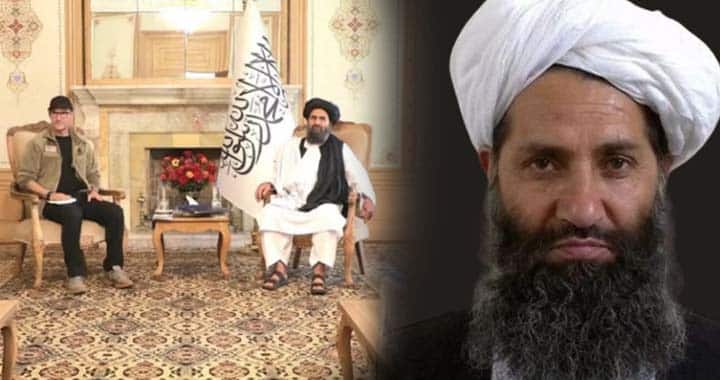Taliban supreme leader Hibatullah Akhundzada is reportedly fuming over Deputy Prime Minister Abdul Ghani Baradar’s recent meeting with a senior US envoy; a move made without Akhundzada’s prior approval or the presence of his loyalists, according to sources familiar with the matter.
Baradar met Adam Boehler, the US president’s special envoy for hostage affairs, in Kabul on 16 September, a session that appears to have triggered a fresh wave of internal discord within the Taliban’s power structure.
Sources told Afghan media that Akhundzada, who governs from Kandahar in near-total seclusion, was angered by the unsanctioned nature of the meeting and is now tightening control over diplomatic engagements. He reportedly insists that only senior officials from his inner circle; such as the ministers of Justice, Hajj, or Higher Education, the chief justice, or governors of Kandahar or Balkh — must be included in any foreign meeting. Their presence, he believes, ensures full compliance with his directives.
The fallout has been swift. Senior Taliban ministers, including Mines and Petroleum Minister Hedayatullah Badri, the finance and economy ministers, and Deputy Interior Minister Ibrahim Sadr, were summoned to Kandahar shortly after the meeting to relay the US delegation’s message and re-establish Akhundzada’s control over such communications.
Baradar, meanwhile, is said to have briefed the Americans on Afghanistan’s deepening economic crisis, rising unemployment, and the Taliban’s alleged anti-narcotics efforts. Boehler reportedly acknowledged that both sides had adhered to the Doha Agreement, and Baradar’s office claimed a prisoner exchange was discussed and agreed in principle.
However, Akhundzada reportedly sees Baradar’s outreach, and earlier informal contacts with former US envoy Zalmay Khalilzad, as defiance. One source said:
“He already dismissed Khairullah Khairkhwa from the Information Ministry for disobedience. Now, he’s looking for an excuse to sideline Baradar as well.”
No official Taliban statement has been released to clarify the rift.
Mounting Tensions Within the Ranks
This internal friction is not an isolated case. In recent weeks, signs of deepening divisions within the Taliban leadership have become increasingly public.
On 10 September, Taliban Interior Minister Sirajuddin Haqqani made an unusually candid appeal during a meeting with top Interior Ministry officials. He stressed the need to win public trust and improve internal security, warning that failure to do so would threaten the survival of the Taliban-led regime.
Observers noted that Haqqani’s remarks; calling for better “individual and social security” were a veiled critique of Akhundzada’s rigid leadership style, which has drawn criticism both inside and outside the group.
The Taliban continues to face global condemnation over its hardline policies, including:
The ban on girls’ education, now extended to religious institutions;
Efforts to restrict women’s presence in public life;
Growing authoritarian control by a narrow clerical elite;
And the exclusion of ethnic and political minorities from any meaningful participation.
Haqqani’s appeal for reform follows an earlier standoff in early September, when he refused to implement Akhundzada’s austerity directive calling for a 20% cut in government staff. His resistance left Interior Ministry employees unpaid for two months, further exposing the fractured nature of Taliban governance; where ministries are increasingly run as independent power silos, not as parts of a unified administration.
Taken together, these developments reveal two sobering realities:
The Taliban’s internal power struggles are growing more visible and consequential.
Even senior leaders now acknowledge the regime’s failure to gain public trust, a failure that may ultimately prove more dangerous than any foreign pressure.





